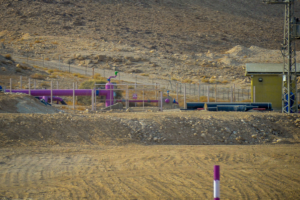Netanyahu’s annexation of Jordan Valley already a reality, say Palestinians

Pipes taking water from a spring to a settlement
Qassam Muaddi writes in Middle East Eye:
“We bought this tank two weeks ago and it is half empty already,” Ghawanmeh explained. “We used to buy water from the nearby town of Al Awjah. Now even people in Al Awjah have to buy water themselves.”
Ghawanmeh’s community is composed of 120 Palestinian families, totalling between 750 and 800 people. They are refugees from the northern Naqab desert, forced off their lands by Israel in 1948.
Since then, they have lived in the Jordan Valley, classified under Area C since the Oslo accords of 1993. That means they are under the direct authority of the Israeli occupation, surrounded by Israeli settlers on all sides. Settlers, who never lack water, occupy the space where Ghawanmeh’s family used to graze their sheep, not many years ago. Settlers who live and act as if they were living in the state of Israel.
In September, one week before the Israeli elections, Israel’s Prime Minister Benjamin Netanyahu announced his plan to annex the Jordan Valley if he won. On Thursday, in the International Criminal Court’s (ICC) annual report, ICC prosecutor Fatou Bensouda expressed concern over Netanyahu’s proposal.
In response, Netanyhau told Israel’s Haaretz newspaper that it was Israel’s full right to annex the Jordan Valley if it chose to do so. He also said he had spoken to US President Donald Trump earlier this week about the annexation. The electoral promise has put the subject of annexation back in the forefront of international interest.
However, despite the official European rejection of Netanyahu’s declaration and the condemnation by the Arab states, for Palestinians like Ghawanmeh, Israel’s annexation is more than a political aspiration. It is a daily reality.
A reality that is “systematically reinforced and advanced by Israel,” according to Maha Abdallah, legal researcher at the Palestinian human rights organisation Al-Haq. “Most aspects of annexation are visible already in the West Bank,” said Abdallah. “The most obvious of these aspects is the settlement-building and the infrastructure linked to it. “But there is an entire process of legal, economic and administrative annexation.”
